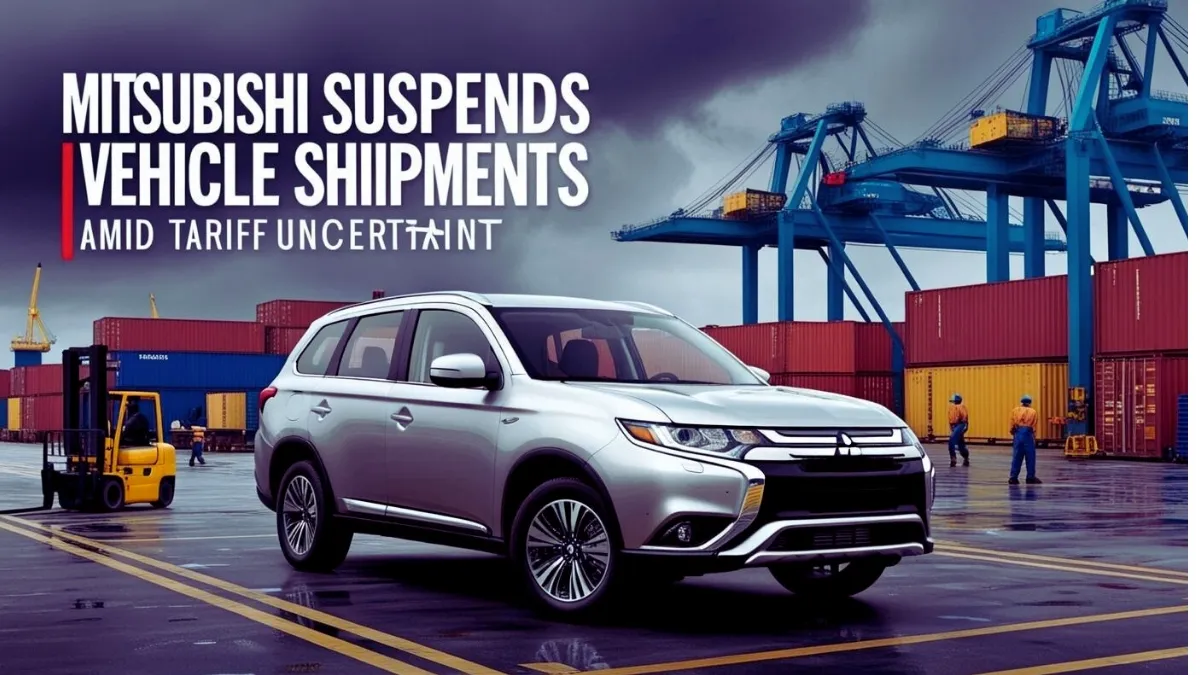Mitsubishi suspends U.S. vehicle shipments amid tariff uncertainty, causing ripples across the global auto industry. This sudden move, prompted by unclear U.S. trade policy on tariffs, has put dealers and consumers on edge — especially in key international markets like the Gulf region, including Kuwait.
The Japanese automaker announced that it would temporarily halt vehicle exports to the United States due to increasing uncertainty surrounding potential import tariffs. As global markets react, this decision is being closely watched by automotive stakeholders, especially in the Middle East, where demand for Japanese vehicles remains strong.
Why Mitsubishi Halted U.S. Shipments
The core issue stems from the U.S. government’s review of Section 232 tariffs, which allow tariffs to be imposed on imports that pose a threat to national security. While aimed at protecting domestic industries, this move has triggered confusion for international automakers like Mitsubishi.
Mitsubishi’s spokesperson confirmed that the company is currently reassessing its supply chain strategies. The goal? Avoid unexpected costs or delays if new tariffs are imposed. As a result, all U.S.-bound vehicles are being held back until further notice.
What This Means for Gulf Markets Like Kuwait
While this halt directly affects the U.S. market, it also has indirect consequences for global automotive supply chains — particularly in Gulf countries such as Kuwait. These regions often rely on trans-shipped vehicles or shared production resources. If Mitsubishi shifts its vehicle allocations away from the U.S., it may affect availability and pricing elsewhere.
For Kuwaiti car dealers and enthusiasts who favor Mitsubishi’s fuel-efficient sedans and rugged SUVs, this could mean:
- Delayed arrival of new models
- Price hikes due to supply constraints
- Reduced promotional offers or stock clearance events
Moreover, any global slowdown in Mitsubishi’s operations can ripple through its entire dealership and service ecosystem, including after-sales support, spare parts, and maintenance schedules.
Mitsubishi’s Strategic Alternatives
To mitigate the disruption, Mitsubishi is exploring alternate shipping routes and expanding its focus on other growing markets, including the Middle East and Southeast Asia. The Gulf region, with its steady demand for reliable and affordable vehicles, could benefit from this shift — assuming tariff tensions in the U.S. continue to escalate.
Mitsubishi also hinted at boosting local production or seeking joint ventures in regions like ASEAN or the Middle East to safeguard against future tariff risks. For Kuwait and neighboring countries, this could eventually mean more regional assembly options or direct imports from non-U.S. hubs.
What Car Buyers Should Do Now
If you’re planning to buy a Mitsubishi vehicle in Kuwait or the wider Gulf region, here’s what you should consider:
- Act Quickly: Existing stocks might be unaffected — for now.
- Stay Informed: Keep an eye on dealership announcements and delivery schedules.
- Consider Alternatives: If the delay extends, rival brands may offer faster availability.
Final Thoughts
As Mitsubishi suspends U.S. vehicle shipments amid tariff uncertainty, the global auto market stands at a crossroads. For Gulf nations like Kuwait, this could either be a short-term challenge or a long-term opportunity — depending on how Mitsubishi redirects its global strategy.
For now, automotive fans and industry players should monitor updates closely, as this story continues to develop and reshape the global car landscape.
Sweb Alam is the founder of AutoVeda, covering the latest car news, reviews, and trends with a focus on the Gulf region. He’s passionate about automobiles and aims to keep readers informed and inspired

1 thought on “Mitsubishi Suspends U.S. Vehicle Shipments Amid Tariff Uncertainty — Major Impact on Global Supply Chain”